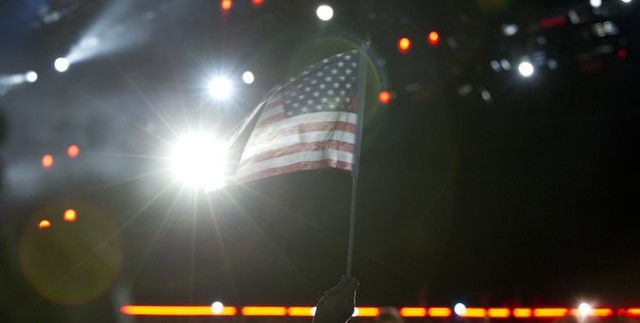American Patriotism Is on the Rise, But for How Long?

A new survey is revealing an increase in patriotism, especially an appreciation for America’s birthday. A Rasmussen Reports poll published Tuesday found that 55% of Americans consider Independence Day to be on the nations’ “most important” holiday’s — that’s up from 53% just last year. Only 6% of Americans ranked the holiday one of the “least important.” However, only 34% of Americans responded that the Founding Fathers would view America today as a success.
Though marginal, the increase over last year’s patriotism is heartening, and it comes largely from the expected quarters: Republicans (at 69%) and unaffiliated voters (at 55%) are more likely to rank Independence Day as important compared to Democrats (at a paltry 44%). Somewhat ironically, though by no means surprisingly, Democrats (at 42%) are more likely to say the Founding Fathers would see America today as a success than unaffiliated voters (at 31%) and Republicans (at 29%), despite also ranking Independence Day as less important.
These statistics, while interesting, can only be properly understood in light of other cultural trends and, of course, in light of both history and objective moral truth.
First, to other cultural trends — namely, the shift away from religion. A recent Pew Research Center poll reported that religious service attendance is down post-COVID lockdowns, dropping from only one third of Americans in 2019 to a meager 30% in 2022. A more recent report from the Public Religion Research Institute found only 16% of Americans considered religion the most important aspect of their lives. The results of this decline in faith are evident across politics, media, culture, and nearly every stratum of American society: from the inundation of pro-LGBT propaganda to America’s cataclysmic split over abortion to the prevalence of divorce and pornography, and the list goes on.
This leads to the next point to consider: history. The form of government devised by the Founding Fathers was unique up to that point in history, crafting a sort of hybrid from ancient republics like Rome, free democracies like those proposed by French Enlightenment writers, and even from England itself, most notably the Magna Carta, a precursor to America’s Constitution. The Magna Carta came about in circumstances similar to those resulting in the American Revolution. The 13th century King John of England (perhaps best known as the archvillain in the “Robin Hood” stories) pushed the nation’s barons too far in abusing his power as monarch, particularly by levying unfairly high taxes. The baron’s revolted and pressured John to sign the Magna Carta, which established that the king was subject to the law, he could only make new laws with consent of the governed (represented by the barons), and his subjects owed him obedience not absolutely, but only on the condition that he governed justly and in their interest.
Similar ideas can be detected in America’s Constitution. It may surprise many to learn that the Founding Fathers’ chief issue was not solely with monarchy but with Parliament. The grievances listed against King George III in the Declaration of Independence largely center on his inaction — both his failure to protect the American colonies from Parliament’s seemingly Draconian laws and his refusal to consent to the predominantly-English-blooded colonists representing themselves and their interests in Parliament. The British Parliament was the aggressor, in the eyes of the Founding Fathers, interfering with the colonies’ internal self-governance, levying increasingly-disproportionate taxes on the colonists, stationing a standing army in America and forcing the colonists to pay for it, restricting freedom of speech, and more. The king was not the aggressor, and the colonists didn’t outright reject the notion of a constitutional monarchy.
In fact, officers of the Continental Army during the Revolutionary War even petitioned George Washington to be king of the United States and do away with the fledgling Continental Congress. Washington famously rejected the offer and, when his troops grew restless after months of no pay issued by Congress, Washington prevented a military rebellion and ensured his men respected whatever new form of government Congress decided to bestow upon the young nation. The authors of the Constitution even considered a constitutional monarchy. When the Constitutional Convention closed in Philadelphia in 1787, Benjamin Franklin was famously asked what form of government had been decided upon, a monarchy or a republic. He responded, “A republic — if you can keep it.” Those words, “if you can keep it,” are crucial.
This leads, then, to moral truth. Under a monarchy, a king accepts tremendous responsibility for his people; while it’s true that not all kings have upheld that responsibility, and some have even neglected it and abused their powers, the responsibility itself has always existed. The form of government the Founding Fathers bestowed upon America is, in some ways, a more grown-up form of government. Every citizen — from the wealthiest to the poorest, from the strongest to the weakest, from the smartest to the dullest — is entrusted with the responsibility of governing himself and his fellow men. In order to live up to that responsibility, a virtuous populace is required, a people noble enough to give of themselves to tend to the souls of others, and wise enough to know how to do so.
The slight rise in patriotism is heartening not least because patriotism is a virtue. Christian thinkers from Thomas Aquinas to C.S. Lewis have long considered patriotism a virtue, falling under the cardinal virtue of justice, which demands giving to each one his due; patriotism is giving to one’s fatherland the respect and, in a sense, filial devotion it is due. But the contrasting decline in the practice of religion bodes ill, as does the steep rise in recent decades of moral relativism, hedonism, and degeneracies the Founding Fathers could likely never have imagined. For nearly 250 years this American republican has stood, but without virtue can we keep it?
AUTHOR
S.A. McCarthy
S.A. McCarthy serves as a news writer at The Washington Stand.
EDITORS NOTE: This Washington Stand column is republished with permission. All rights reserved. ©2023 Family Research Council.
The Washington Stand is Family Research Council’s outlet for news and commentary from a biblical worldview. The Washington Stand is based in Washington, D.C. and is published by FRC, whose mission is to advance faith, family, and freedom in public policy and the culture from a biblical worldview. We invite you to stand with us by partnering with FRC.



